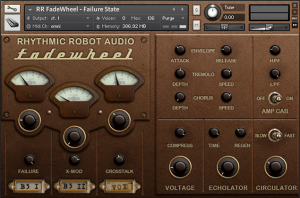
 Rhythmic Robot Audio has released FadeWheel, a simple but versatile tonewheel organ machine that aims to make a front-and-centre feature of "failings" such as crosstalk, leakage, intermodulation and component failure.
Rhythmic Robot Audio has released FadeWheel, a simple but versatile tonewheel organ machine that aims to make a front-and-centre feature of "failings" such as crosstalk, leakage, intermodulation and component failure.
Designed as an antidote to overly-clean organ sounds, FadeWheel allows the user to dial up basic sounds using a simple but flexible combination of three waveform generators – a simple, fundamentals-only B3 wave; a more complex B3 wave with more upper harmonics; and a transistor Vox wave with a lot of atonality – and then progressively to distort and dirty these up using the Crosstalk, X-Mod and Failure controls. The results can range from typical Hammond or Vox tones with an extra degree of age-related instability, through to completely damaged-sounding tones that can form the basis of sound design or synth-type patches.
Further control over the sound comes from a simple Attack / Release envelope, twin high- and low-pass filters, and a suite of hand-tailored effects (including rotary speaker, chorus, echo, amp cab simulation and distortion). FadeWheel is intended both as an organ simulator but with considerably enhanced levels of grime, grit and dirt; or as a tool for creating soundscapes, pads and radiophonic effects which have an identifiable tonewheel component to them. It is designed to be ideal, then, for tracks which want to enhance or exaggerate the vintage failings that typify tonewheel organs; or which want to create synth-type sounds with a tonewheel basis.
Price: £15. Available now at a special reduced price of £12.
Requires a full version of Kontakt version 4.2.3 or above (including any version of Kontakt 5). Kontakt Player is not supported; FadeWheel will load, but times out after 15 minutes.




 Other Related News
Other Related News